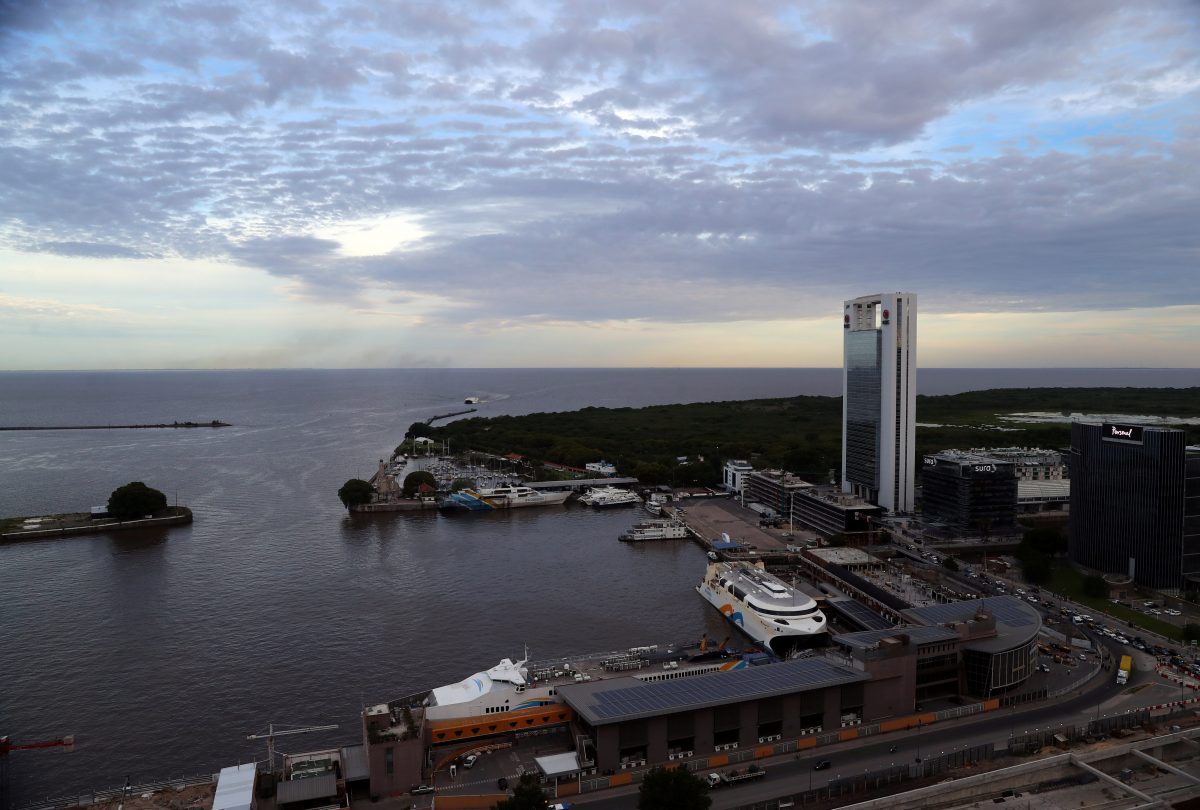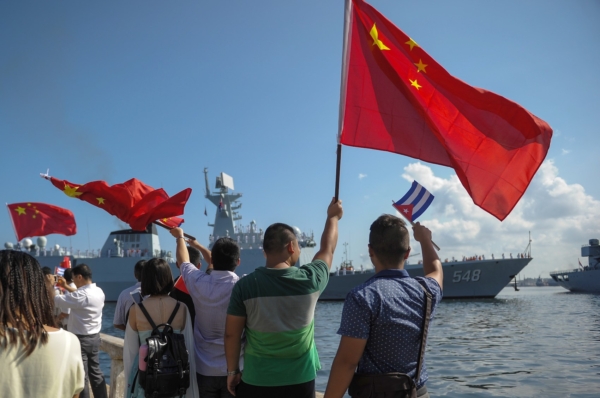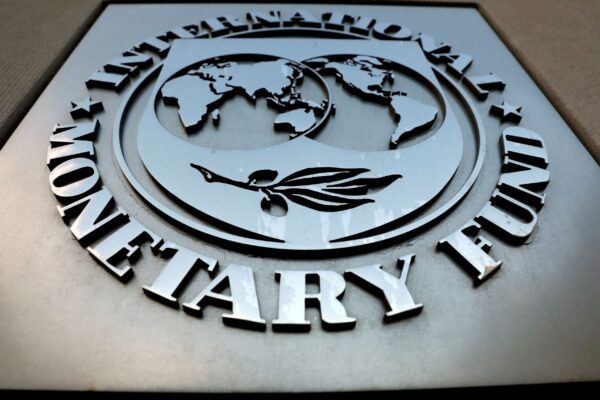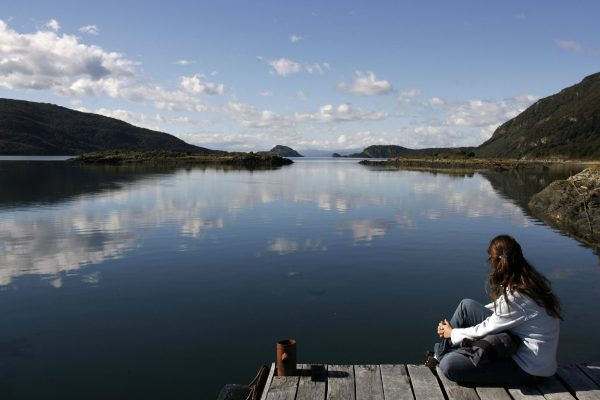


China’s rapidly expanding military and surveillance initiatives across Latin America have become more than just a thorn in the side of Washington.
In Argentina’s southern tip, Tierra del Fuego, on June 5, Governor Gustavo Melella greenlit a”multi-purpose” Chinese-operated port facility through decree 3312/22, which entered the provincial legislature the same day. The country currently houses a Chinese military-run facility operating in the remote Neuquén Province.
Final approval is still needed from the national government and the undersecretary of ports, waterways, and merchant Marine to move forward.
The Chinese Communist Party (CCP)-affiliated company involved in the port facility is Shaanxi Chemical Industry Group. Though civilian on the surface, the U.S. State Department expressed concern over Beijing’s prioritization of “military-civilian fusion,” a state strategy that forces Chinese companies to share technology and assets with the CCP military.
In the agreement signed by Melella, it states, “The smooth construction of the project will be exemplary for the investment of Chinese companies in southern Argentina.”
In March, top U.S. military officers, including U.S. Southern Command Gen. Laura Richardson, warned that China’s “aggressive” expansion in Latin America isn’t some long-term threat to U.S. interests and security.
It’s happening right now.
“The PRC [People’s Republic of China] has expanded its ability to extract resources, establish port, manipulate governments through predatory investment practices, and build potential dual-use space facilities,” Ms. Richardson said during a March 8 House Armed Services Committee hearing.
Like-minded security analysts and a former Argentine government official have expressed similar concerns over potential military and surveillance applications of China’s new port being built in the town of Rio Grande, Tierra del Fuego.
Ideally situated near the Straights of Magellan, a CCP port facility in Rio Grande offers direct access—and potential control—over the world’s second most important shipping lane between the Western and Eastern hemispheres.
Cuba is a good lens for understanding how CCP projects with Latin American governments typically unfold.
Interstingly, the Rio Grande project was approved a week before The Wall Street Journal published a story discussing China’s “Project 141” initiative—the regime’s blueprint for how it intends to grow a global military and logistical support network.
One of the projects identified was a joint China-Cuba spy facility near Havana. The Biden administration later confirmed the existence of a Chinese spy base operating in Havana since 2019.
“I believe there is an integral alliance at all levels between the CCP regime and the Castro-Canel regime. We know training is taking place. It’s documented,” regional analyst and author Orlando Gutiérrez-Boronat told The Epoch Times.
Military and surveillance cooperation between China and Cuba isn’t anything new, but Mr. Gutiérrez-Boronat believes a deeper level of security engagement between the two nations offers a means of helping Cuba’s communist government a way to hold fast to its faltering grip on power.
“We know that Chinese companies quickly acted to cut internet access in Cuba during the popular uprising of July 11, 2021,” he said, adding, “I think the regime seeks the Chinese presence in order to guard itself from its own people.”
But Cuba’s regime isn’t the only Latin American government on the ropes with its own people. As the October presidential election closes in, insiders say Argentina’s Peronist government is scrambling to create economic stability in a bid to stay in power.
And cooperation with CCP security initiatives is part of the deal when it comes to cashing the checks they write.
“Evan as a private port facility, the opportunities it creates are important for those running that facility,” Evan Ellis, a Latin America research professor for the U.S. Army War College Strategic Studies Institute, told The Epoch Times.
Mr. Ellis noted that while China’s engagement in the region is mostly economic, the CCP is “increasingly operating in strategic spaces” with secondary benefits and military purposes.
And the Rio Grande facility in Tierra del Fugeo offers an enticing opportunity for strategic and military applications.
“China has never hidden their desire to create military options,” Mr. Ellis said.
While dual-use port facilities in Rio Grande and the China-Cuba surveillance project may not seem like huge steps forward, Ellis noted the CCP is definitely “stepping up their game.”
For China, Ellis says it’s all about creating “strategic options.”
Presently, there’s no more eager friend of China than Argentina’s Peronist regime. Within the leftist government, controversial politician and Vice President Cristina Kirchner is Peronism’s greatest champion.
A self-described “militant” Peronist, Ms. Kirchner’s disastrous economic practices during her presidency from 2007 to 2015 laid the policy foundation for the nation’s current astronomical inflation. In June, Argentinian economist Carlos Perez predicted the country’s inflation would average 147 percent in 2023 while the GDP is expected to fall up to 3.5 percent.
Today, Argentina’s peso has plummeted dramatically. The currency’s official exchange rate has devaluated more than 100 percent in the past year amid international loan defaults, dwindling foreign currency reserves, and soaring poverty rates.
But Ms. Kirchner’s supporters remain loyal at both the legislative and civilian levels. Among the cornerstone philosophies of “Kirchnerism”—as it’s locally known—is a favorable disposition toward China’s interests.
And Tierra del Fuego’s Governor Melella is an ardent disciple of “Kirchnerism.”
“His position is very pro-China,” former Argentinian government official and political analyst Fabian Calle told The Epoch Times.
The debate surrounding the port aside, Mr. Calle thinks the national government may still approve the Rio Grande project. He says the current stall is due to ongoing negotiations for a new round of loans and repayment extensions from the World Bank and International Monetary Fund (IMF).
In March, the IMF released a statement saying an additional $5.3 billion dollars in funding for Argentina was pending final approval.
Compounding this is the country’s dire shortage of foreign currency reserves factors at the federal level. “They want dollars,” Mr. Calle said.
But the country’s embattled Peronist regime under President Alberto Fernández is also hungry for investment and an economic lifeline.
And Beijing’s pen is always poised and ready to write a check.
The Chinese state-owned defense corporation Norinco Group met with Argentina’s Defense Minister Jorge Taiana in April to discuss an arms deal involving ammunition, personal security equipment, and the modernization of armored vehicles, according to a government document.
Many Argentinians don’t like the idea of Beijing running a port in the pristine wilderness of southern Patagonia. Still, it’s not the first time the CCP military has built a facility where even Argentinian officials cannot enter without special permission.
The CCP currently runs the notorious satellite tracking station Espacio Lejano in the remote Neuquén Province in northwest Patagonia.
“Argentina already has a Chinese military base … It’s linked to the Chinese military space [program],” Mr. Calle said, referring to the infamous Espacio Lejano facility.
Mr. Calle quickly pointed out the mercurial nature of how Argentine politicians feel about foreign countries bringing in their military. From the perspective of the current regime, he said, “When the base is American, it’s a violation of Argentina’s sovereignty. But when the base is Chinese, it’s welcome.”
“It seems that patriotism for Kirchner supporters is selective,” he said.
At nearly 54 degrees south in latitude, a Chinese port in Rio Grande also offers advantages for the CCP’s rapidly expanding surveillance network.
Having a station—or port—that can communicate with satellites in polar orbit offers ideal coverage for observing the entire planet. This includes remote regions that are difficult to survey from latitudes closer to the equator. Beyond a wider coverage base, the extreme southern position of China’s new port in Rio Grande could also offer enhanced signal clarity and transmission abilities.
It’s also in the middle of nowhere, which analysts say is another benefit.
Aside from being the southernmost land mass outside Antarctica, Tierra del Fugeo boasts a year-round population of barely 150,000 people. Of that, Rio Grande has around 79,000 people.
“It’s out of the way. It’s not somewhere people end up for no reason,” Irina Tsukerman, security analyst and founder of Scarab Rising, told The Epoch Times.
Ms. Tsukerman said there’s no better way to move something covertly than a remote shipping port. She pointed out there’d be minimal interference with governing bodies. This appears likely, given Argentina’s established history of letting the CCP run covert space operations. Further, she added the Rio Grande port is ideal for moving literally anything. This includes everything from vital chemicals and minerals to weapons or narcotics.
“If you want to get someone or something in or out of a country, there’s no better place than a port,” Ms. Tsukerman said.
But perhaps the most critical element of China’s arrival to the shores of Tierra del Fuego is the timing. Argentina is in the throes of its worst economic crisis in decades. With that desperation comes hasty decisions that could easily end with the arrival of the Chinese navy.
This exact scenario happened in Sri Lanka. After the government defaulted on a $1 billion Chinese loan, Beijing seized control of the port it funded with the loan through a 99-year lease that began in 2017.
Fast forward to August last year, when a Chinese naval ship suddenly arrived at Hambantota port. Security analysts quickly identified the ship as a military vessel with an established history of tracking satellites and missiles.
Not surprisingly, the port is near an important Indian Ocean shipping lane.
Ms. Tsukerman said the same “debt trap” model could easily be used to take control and install CCP military installations in Argentina or other locations in Latin America.
“You have to look at China in terms of financial control over Argentina … because it’s in so much financial trouble,” she said.
Mr. Ellis agrees with this sentiment. He said China has always “cast their net very, very broad” and engages a country at every level, from academia to politics, media, and energy.
“To me, that kind of web of Chinese influence is strategic at the core,” Mr. Ellis said, adding the military applications of China’s multi-purpose facilities are just the “ornaments on the tree.”



